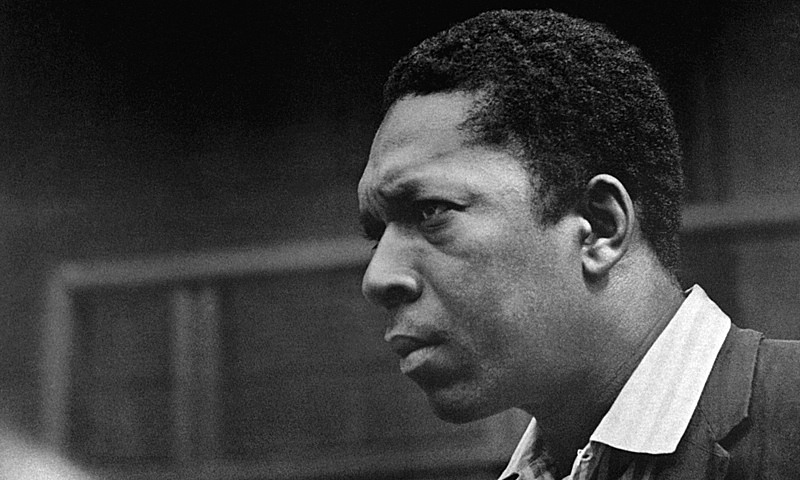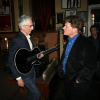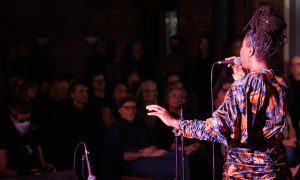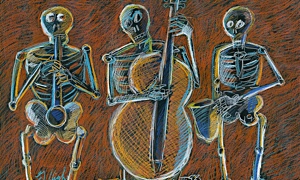Home » Jazz Articles » What is Jazz? » The Virtues of Jazz
The Virtues of Jazz

These four virtues of jazzЎӘtradition, collaboration, improvisation, and transcendence... are also gifts for the larger world outside of jazz...
On the other hand, those who attempt to play the flute—or lead a jazz band—and fail to master the requisite skills for these endeavors display vice. This term has come to be associated with things like "the vice squad," but historically it applies to any task done so poorly as to merit criticism. For example, a drummer who often plays behind the beat or in the wrong time signature fails to perform properly—to keep the beat. As such, the playing is musically vicious (although not morally so).
Jazz, of course, exhibits musical virtues, which is why we love it. The music has a rich, deep and fascinating tonal history, from ragtime to swing to bebop and beyond. It has given us some of the greatest tunes of the Twentieth Century, such as "Take the A-Train" and "Round about Midnight." Jazz has manifested geniuses such as

Louis Armstrong
trumpet and vocals1901 - 1971

Duke Ellington
piano1899 - 1974

Miles Davis
trumpet1926 - 1991

John Coltrane
saxophone1926 - 1967
Yet there is another set of jazz virtues. These virtues are snugly related to the musical virtues, but are not identical to them. Although a necessary part of jazz, these virtues speak to us about matters off the bandstand and outside of the recording room. They give us practical advice and inspiration for the challenges of life. We might call them "virtues of the wise life." Let us jam on just four of them: tradition, collaboration, improvisation, and transcendence.
Jazz has a thickly textured and fascinating history of development that has given us a tradition worth noting. In Ken Burns's delightful documentary, Jazz (2000), author Gerald Early claimed that three things are unique and extraordinary about America: The Constitution, baseball, and jazz. In fact, one cannot understand American history or American character without recognizing the seminal role that jazz has played. This is true in two ways.
First, while the cultural origins of jazz may be traced to red light districts in New Orleans, its spirit was never imprisoned there, since jazz performance calls for talent, effort, and courage. This was particularly true for African-American artists who were only allowed to desegregate from whites while they were on the stage or in the recording room. Yet by talent, toughness, and class, a man like Duke Ellington could bring honor and respect to his race as a jazz composer, bandleader, and pianist (and never underestimate his playing). So, the tradition of jazz is one of struggle and ascent for not only the music itself (first called by some, "the devil's music"), but also for those descended from slaves. In 1971, Duke Ellington received the President's Medal of Freedom, which was a million miles up from playing only with blacks and only for whites at The Cotton Club in the 1920s.
Second, the tradition of jazz respects the elders and the standards. No one joins the jazz family without studying their musical forefathers. Here are just a few examples. If you play trumpet, you must understand Louis Armstrong and Miles Davis; if saxophone, then

Coleman Hawkins
saxophone, tenor1904 - 1969

Johnny Hodges
saxophone, alto1907 - 1970

Kenny Clarke
drums1914 - 1985

Buddy Rich
drums1917 - 1987

Bud Powell
piano1924 - 1966

Keith Jarrett
pianob.1945

Jimmy Blanton
bass, acoustic1918 - 1942

Paul Chambers
bass, acoustic1935 - 1969

Charles Mingus
bass, acoustic1922 - 1979
In its respect to (but not enslavement by) tradition, jazz calls us to remember the past, to salute our elders, and to not get too big for our britches. We stand (and swing) on the shoulders of giants. Moreover, newer may not be truer; often the truth stands fixed in the past, from where we can observe it and be inspired by it. Hip chops are not limited to today.
Jazz also demands and respects collaboration. While jazz musicians usually take solos (although

Freddie Green
guitar, acoustic1911 - 1987

Count Basie
piano1904 - 1984

Sonny Rollins
saxophoneb.1930

Peter Brötzmann
woodwinds1941 - 2023
The collaboration involves collective improvisation. One player does not solo over the top of a backing band (as with Kenny G). Rather, the whole group improvises and plays off each other, usually with great affection and appreciation for each other. You need "big ears" to collaborate in jazz. You must listen hard before and while you play. For example, the drummer hears and follows the sax. Unparalleled in this regard were John Coltrane and

Elvin Jones
drums1927 - 2004
The jazz spirit of creative collaboration teaches us to give our best and bring out the best in others—in whatever setting we find ourselves. To collaborate wisely we need to discern our own strengths and weaknesses in relation to the potential of our friends, family, and co-workers. As a philosophy teacher, I endeavor to collaborate with students as I solicit questions, field questions, and jam on new ideas given to me live in the classroom. I also learn from student's papers (we are in the same band) and make comments on them. Better yet, we meet at a local water hole and talk it over. (And all for the better if jazz is playing in the background.) This is all done in the spirit of jazz. Join me in whatever field in which you work.
I touched on it above, but more needs be said about the virtue of jazz improvisation, without which there is no jazz. In The Imperfect Art, Ted Gioia?rightly claims that jazz improvisation is akin to someone composing on the spot. The musician cannot go back and erase the notes and try again, as can a composer in his room. What is said is done. Mistakes can and will be made, but jazz people deem it worth the risk, since the successes are so satisfying. The distinguished jazz critic, Whitney Balliet, wrote that jazz is "the sound of surprise." He was right.
Despite what some think, jazz improvisation is not creating in a void or simply winging it. Rather, the improvisation of a soloist must harmonize with the styles of the players in her band and must resonate with the whole tradition of jazz. Moreover, solo improvisation need to fit within the contours of the particular piece that is being played. A ballad requires a certain kind of solo; a tune with a fast walking bass line calls for another kind of solo. To illustrate, consider John Coltrane's playing on the studio version of "Naima" (a moving ballad written for his first wife) and his playing on the many versions of "Impressions," an up-tempo piece that allows him to stretch out into the stratosphere, but without leaving his bandmates earthbound.
Through disciplined and daring improvisation, jazz musicians also learn how to develop their own voice, their own distinctive way to make music on the spot. A musician does not find his voice by copying his mentors. That is pure imitation, not improvisation. Jazz guitarist extraordinaire,

Pat Metheny
guitarb.1954

Wes Montgomery
guitar1923 - 1968
Jazz improvisation gives us a model for skillful and sympathetic work with others across the spectrum of life's endeavors. Please indulge me another reference to teaching. The older I get, the more I find my voice as a teacher. I know the tradition fairly well, have taught for many years, and thus feel free to improvise on ideas with my students. That does not mean that anything goes. Rather, I am free to ask questions and make remarks (and sometimes role play) within a field of discourse (or tradition). By improvising, you risk losing the rhythm of the class or leaving it behind. (In some cases, a student may leave me behind.) However, this improvisation allows for peak teaching and learning experiences, and I cannot leave it behind. I wager that in every field, the virtues of jazz improvisation can inspire more meaning and enjoyment. A lawyer approaches a case within the tradition of law, but uses his own voice in interacting with his client and planning a strategy. One must "go by the book" (tradition), but one can also write a few new chapters in the spirit of the book. One could go on, but I hope I have made the point.
The last virtue—transcendence—may seem oddly placed in this essay; and its relationship to jazz differs from that of tradition, collaboration, and improvisation. Transcendence is a term that means to rise above something. Thus, the intellect of a human (we hope) transcends that of a dog, although the dog can communicate with and appreciate the intellect of humans. But there is something beyond them. Similarly, a jazz aficionado's understanding of John Coltrane's playing in A Love Supreme, transcends that of a jazz neophyte who thinks that it sounds "weird." But how can transcendence be a virtue as a part of jazz?
Most high-level musicians, whatever their worldview might be, attest to experiencing something high and exalted in their playing jazz. For example, avant-guarde saxophone titan Peter Br?tzmann reported in an interview that "music comes from somewhere else." The context for this remark was that music rises above the grievousness and grubbiness of common life under the sun. At its best moments, jazz (and other kinds of music) seems to signal something sacred, something beyond the reach of a purely psychological or material explanation. Magic happens when the muse is afoot and the band is swinging. This virtue, however, is of a different order than that of tradition, collaboration, and improvisation, since its presence is more of a visitation than of the sum of jazz's excellences. Drummer Elvin Jones' commented that he sensed an "almost telepathic" communication between the members of Coltrane's classic quartet. This dimension of jazz at its apogee may be worth musing on. It may even be a key that fits a lock that opens a door to something wonderful and real beyond our dreams.
These four virtues of jazz—tradition, collaboration, improvisation, and transcendence—are gifts for the entire jazz world. But they are also gifts for the larger world outside of jazz where human beings search for meaning and truth in their vocations and in all their endeavors. The old philosophers and sages told us to pursue virtue and eschew vice. Jazz, at its best, gives us some strong clues on how to do it—if we have ears big enough to hear it.
Tags
John Coltrane
What is Jazz?
Douglas Groothuis
United States
Louis Armstrong
duke ellington
Miles Davis
New Orleans
Coleman Hawkins
Johnny Hodges
Kenny Clarke
Buddy Rich
Bud Powell
Keith Jarrett
Jimmy Blanton
Paul Chambers
Charles Mingus
Freddie Green
Count Basie
Sonny Rollins
Peter Brotzmann
Elvin Jones
pat metheny
Wes Montgomery
Comments
PREVIOUS / NEXT
Support All About Jazz
 All About Jazz has been a pillar of jazz since 1995, championing it as an art form and, more importantly, supporting the musicians who make it. Our enduring commitment has made "AAJ" one of the most culturally important websites of its kind, read by hundreds of thousands of fans, musicians and industry figures every month.
All About Jazz has been a pillar of jazz since 1995, championing it as an art form and, more importantly, supporting the musicians who make it. Our enduring commitment has made "AAJ" one of the most culturally important websites of its kind, read by hundreds of thousands of fans, musicians and industry figures every month.






 Buy Now
Buy Now





















